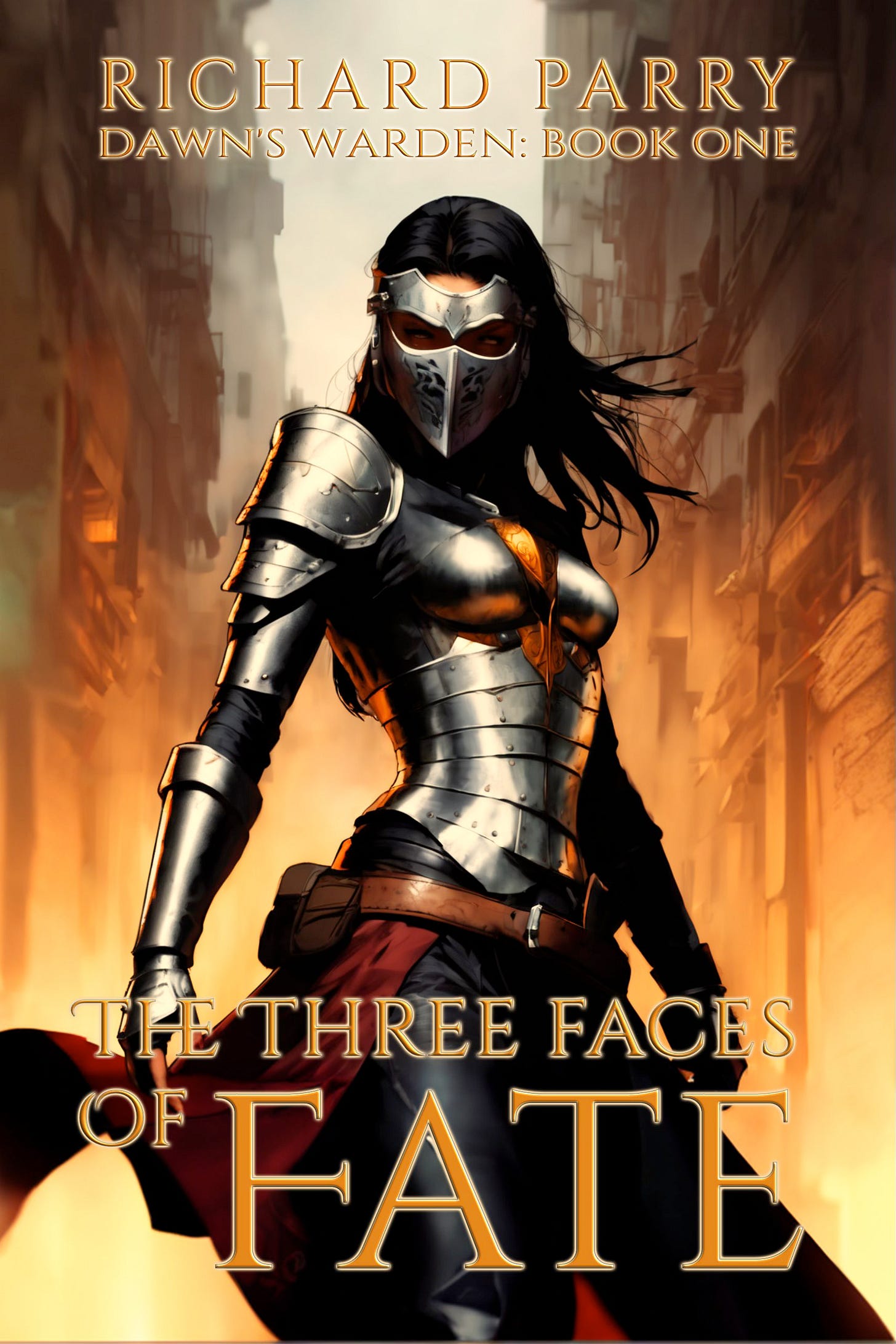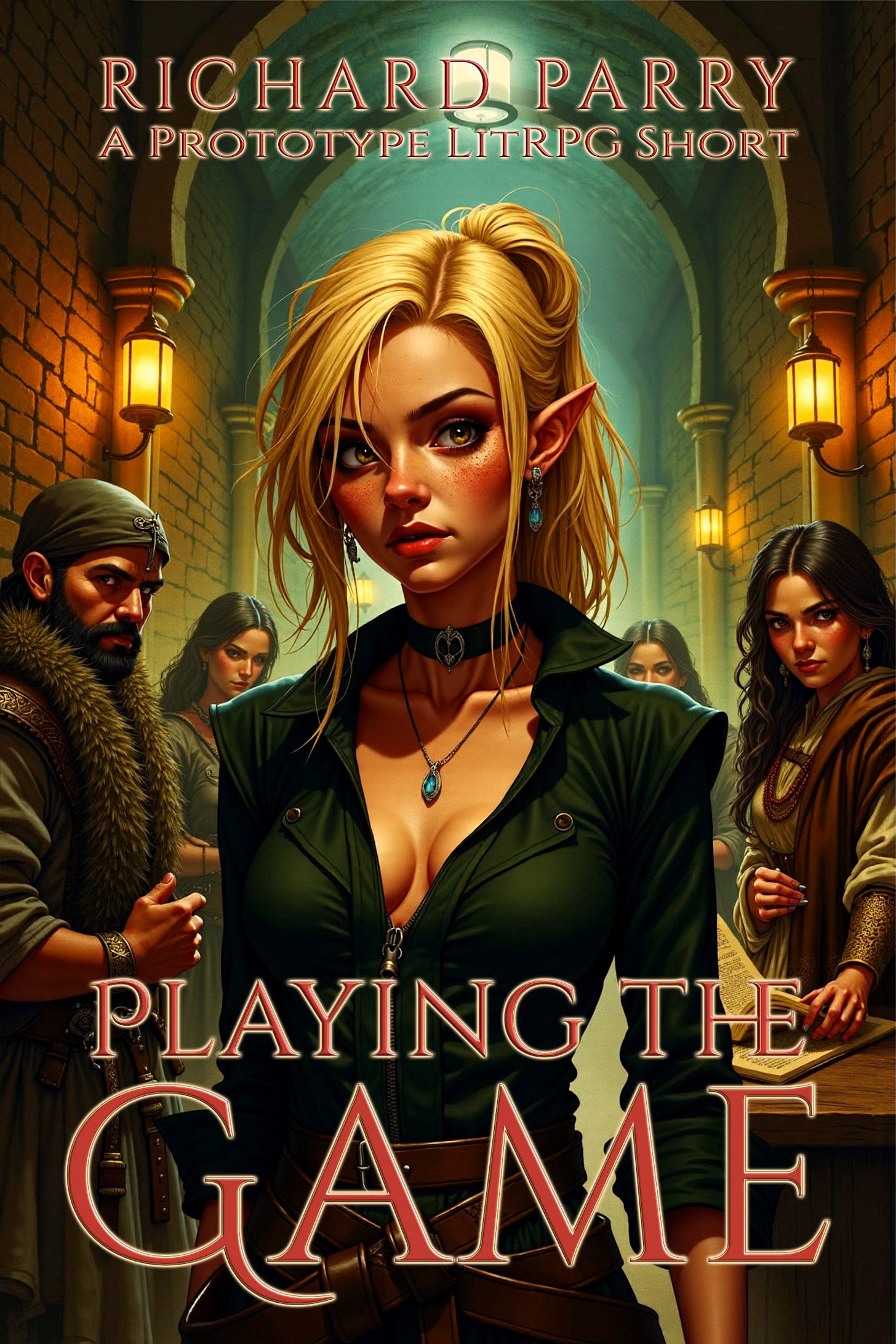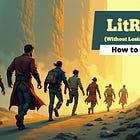Let’s get a little more profound on this shower thought.
This is Part 3 of a 3-part series on LitRPG: its past, how to write it, and why it keeps us coming back.
LitRPG isn’t just about power-ups and progress bars. It taps into something deeper. Why do these stories hit so hard? Let’s autopsy why this genre is fundamental fantasy rather than a fad.
Missed the earlier parts?
Why You Liked LitRPG Before It Was Cool – grave-digging the past on the books that built the genre.
How to Write LitRPG Without Losing the Plot – craft advice for making game-driven stories that (actually) work.
Introduction
There are a few genres that are experiencing break-out success, and with good reason. They scratch an underserved niche and, if done well, expand that niche into a chasm of readership that becomes a defining success. Romantasy is a great example, but we’re here to talk about LitRPG.
You’ll still never pry Paladin’s Grace from my hands, but I will destroy the next person who tells me to read the drivel that’s The Fourth Wing.
LitRPG gets written off as gamer wish-fulfilment, but it’s more like real life with a patch that actually works. If reality had decent devs, maybe we wouldn’t need LitRPG to bridge the gap between our world and gaming worlds. LitRPG plasters over all the gaps where real life just sucks. See, reality has some garbage-tier mechanics:
No XP bar. You work hard, but there’s no ding, no level-up—just weariness and, eventually, arthritis.
No clear objectives. One minute you’re told to chase your dreams; the next, you’re stuck in a meeting about meetings.
No respec option. Pick the wrong career? Marry the wrong person? Whoops, no take-backs allowed.
LitRPG fixes all that by connecting us to gaming logic. It fills in the blanks where life fails, giving us:
Visible progress (grind = reward, no ambiguity).
Structured goals (actual quests instead of vague LinkedIn advice).
Consequences that make sense (screw up, learn, and improve, rather than just eternal suffering).
If it’s just power fantasy, why is it so addictive?
Why LitRPG Hooks Readers So Hard
Since the dawn of time, humans have been telling stories and playing games (sometimes simultaneously). Cavepersons roleplayed mammoth hunts before the first dice were ever rolled. A bard spinning a tale around a fire was just early-access LitRPG with limited DLC. LitRPG fuses these two primal urges into the ultimate escapism package: a story to follow and a game to play (minus the microtransactions).
It works so well because progressing the story is addictive.
Stats, XP, and skill trees? Your brain loves that stuff.
LitRPG gives clear goals and progression! It’s why, “Kill 20 goblins,” feels satisfying, while, “Network with colleagues,” makes you want to yeet yourself into the sun.
A predictable reward system is S-tier because real life doesn’t tell you when you’ve levelled up. (What does a vague “good job” from your boss actually mean?)
Traditional fiction says: Slow-burn emotional growth, quiet revelations, a deeply human transformation. 400 pages.
LitRPG says: TL;DR: LOL. Here’s +5 Strength. Now go suplex a wyvern.
There’s an extra kick in LitRPG because you actually feel the protagonist getting stronger. Compare that to classic fantasy, where some heroes start at max level and just vibe for three books. Take Aragorn. He doesn’t need to grind XP; he logs in fully geared and with pre-order bonuses. The Lord of the Rings delivers him fully specced into Ranger, King, and Certified Himbo. His existence drives home that what Boromir needed was a save point.
In LitRPG, victories feel earned, even when the main character is cheesing the system harder than a speedrunner on a world record attempt. That’s a rush you don’t get from real life, where eight straight hours of meetings just leave you wondering if you’ve levelled up in anxiety. Where reality fails spectacularly, LitRPG provides a structure. In reality, there’s no UI, no tutorial, and no helpful quest log explaining why your coworker passive-aggressively CC’d your boss. But in LitRPG, progress is tangible. Kill ten slimes, get stronger. Do that in the real world, and all you’ve done is attract local authorities.
Your 9-to-5 might not award you “Employee of the Month” for doing 12-hour days, but if LitRPG were in charge, it’d be: Ding! Congratulations, you’ve unlocked “Enhanced Productivity (Level 2): Now with 10% less despair.”
The Urban Fantasy Effect
Question: Why does LitRPG feel so easy to pick up?
Answer: Because half the worldbuilding is already in your head.
Urban fantasy led the pack on this one. It lets readers hit the ground running because they already know how cities work, what police do, and that werewolves probably aren’t just hanging about in Starbucks. I pillaged this goldmine and left with a sack of loot when drafting my latest novel, The Three Faces of Fate. I don’t have to tell you what a city like Anchorage looks like. I just need to tell you about the bullshit redcaps and banshees are putting the fine citizens of Valhaven through.

LitRPG works because it doesn’t waste time explaining what you already know. In 2021, the Entertainment Software Association reported that 227 million Americans (roughly 70%) played video games. Globally, we’re looking at 2.7 billion mobile gamers tapping away at screens like their Candy Crush rank is tied to their mortgage rate. Readers don’t need a 20-page worldbuilding bible on how skills work, because they already understand XP, loot, and level-ups from the gacha bullshit infesting their phones.
This removes the onboarding struggle that bogs down traditional fantasy. You don’t need three chapters explaining how magic works. Just give your mage a mana bar, and boom, we get it. This built-in familiarity is why LitRPG is so easy to devour. LitRPG speaks a language readers already know, skipping the “how-shit-works” phase and dropping them straight into the action. To put it another way, traditional fantasy has a learning curve, and LitRPG has a skill tree you’ve already levelled up in.
From Dream Park to Ready Player One: How LitRPG Evolved
LitRPG wasn’t born in a vacuum. Before characters were grinding XP, they were fighting for their lives in worlds that felt just a little too real. The old guard of Dream Park and Guardians of the Flame were less about exploiting systems and more about surviving them.
Hell, Dream Park played with immersion before VR gaming was even a thing, and Guardians of the Flame asked, “What if this wasn’t just a game?” By mashing together immersive simulation and genuine personal risk, these early works set the respawn point for an entire genre. They rolled a natural 20 on genre innovation, eventually leading to hard-coding explicit game mechanics into LitRPG DNA.
Ready Player One didn’t just cash in on gamer nostalgia—it 100% completed it. It took the idea of immersive game worlds, stripped out the survivalist grit of Dream Park, and said, “What if 80s pop culture was a loot table?” Ready Player One wrapped readers in a +1 Heavy Cloak of Reminiscence, playing up virtual escapism as the ultimate power fantasy, where knowing obscure trivia about Pac-Man could save your life. The High Five may have been legendary inside the OASIS, but outside, they were stuck in the respawn screen of late-stage capitalism. That disconnect between virtual success and real-world struggle is what gives Ready Player One its real stakes. In the end, you can’t clip through poverty.
Where early LitRPGs asked, “Can I survive?” modern LitRPGs ask, “How can I break the game?” The shift toward stat-heavy storytelling means that today’s readers expect more than just immersion. They want mechanics so detailed they feel like they could log in themselves. Some books feel like the protagonist is playing an RPG, rather than living in a world.
This evolution from raw survival in a hostile world to min-maxing every possible advantage marks a hard pivot in LitRPG’s evolution. Dream Park and Guardians of the Flame experimented with immersion and risk; modern LitRPG runs full-speed into system mastery, where knowing how to game the game is the ultimate power. It makes sense. Readers aren’t just here for the story. They crave the satisfaction real life refuses to provide. The world doesn’t give you XP for surviving eight back-to-back Teams calls or a stat boost for remembering to drink water. LitRPG does. In a genre where the rules are clear, the progress is measurable, and effort actually leads to reward, it’s no wonder readers want to break the mechanics rather than just play by them. If billionaires can break the rules, why can’t we? We want to win the game of life, too.
Three Forks in the Road: How LitRPG Split into Different Power Fantasies
LitRPG didn’t just evolve. It diverged like a skill tree on steroids. Instead of settling into a single formula, it fractured into multiple power fantasies, each offering a different way to interact with the game world. Some are all about raw dominance, where the protagonist steamrolls everything in sight. Others lean into strategy and problem-solving, rewarding cleverness over brute force. And then there’s the chaotic wildcard, where power comes with so many unintended consequences that the protagonist is multiclassing in disaster management. Whatever your playstyle, there’s a LitRPG for you.
Let’s start with VRMMO LitRPG (2000s–2010s) – The Overwhelming Juggernaut, a.k.a. Escapist Power Fantasy.
This is where winning isn’t a question, it’s a feature. Virtual Reality Massively Multiplayer Online LitRPG presents a fantasy of absolute control, where the protagonist isn’t just good; they’re preordained to be the server admin of existence.
This era brought us “trapped in a game” stories, where the protagonist either starts OP or gets there so fast the devs would nerf them in the next patch. Sword Art Online, The Legendary Mechanic, and Solo Leveling define this space. The only real threat to the protagonist is running out of enemies. It’s pure power-trip fantasy where the only thing standing between the hero and ultimate victory is the occasional training montage.
The catch is, of course: If there’s no struggle, there’s no tension. The best books in this category (like Solo Leveling) understand this, making sure the protagonist earns their overpowered status instead of just getting handed purple loot at Level 1.
Why does it work? Because it’s escapism in its most undiluted, straight-into-the-vein form. Readers get to experience limitless power, wreck enemies with wildly disproportionate force, and actually see progress (which is more than we get from replying to work emails). Farming for loot in LitRPG gets you godlike abilities. Farming your inbox just gets you more emails.
Next up: Dungeon Core & Survival LitRPG (2010s–Present) – The Struggling Strategist, or as it’s known in polite circles, “Git Gud: The Genre.”
This is the Demon’s Souls of LitRPG, where every fight is a brutal trial by fire, and the only way to progress is through tactical brilliance, sheer stubbornness, and the occasional panicked dodge-roll. Books like The Wandering Inn, The Perfect Run, and Mother of Learning take glass-cannon protagonists and throw them into meat-grinder worlds where one wrong move equals instant obliteration.
If Escapist Power Fantasy is about breaking the system, Tactical Power Fantasy is about barely surviving it. Every stat point is a lifeline. Every spell cast has consequences. And every victory feels less like a power trip and more like a, “Holy shit, I actually did it” moment. No hero ever says, “Hold my beer and watch this.”
Why does this work? Because suffering builds investment. Ever beaten Flamelurker in Demon’s Souls after getting one-shot for an hour straight? That’s what these books feel like. You don’t just cheer for the protagonist, you feel their wins in your bones. Tactical Power Fantasy taps into that same desperate thrill of scraping by on last-minute plays, creative problem-solving, and the unwavering belief that, despite all odds, you can still pull off a miracle.
Finally, we have The Power Fantasy Explosion (2010s–Present) – The Unintended Hero, or “Congratulations, You’re the Boss Fight Now.”
These are the stories where the protagonist isn’t actively trying to become an unstoppable force, but the universe, in all its chaotic wisdom, decides otherwise. Maybe they pick up an overpowered item by accident. Maybe the tutorial boss drops Excalibur with a built-in nuclear payload. Maybe the gods just hate them enough to turn their life into a cosmic joke. Whatever the reason, they keep tripping over power-ups, and suddenly, they’re a walking apocalypse.
Books like Dungeon Crawler Carl and He Who Fights With Monsters thrive on this absurdity. These aren’t power fantasies where the protagonist grinds for dominance. They’re satire-fuelled train wrecks where reality keeps bending over backward to make them absurdly OP. And, naturally, there are consequences. They attract divine enemies, apocalyptic cults, and political schemes so convoluted they make Game of Thrones look like a children’s pop-up book.
Why does this work? Because chaos is entertaining. Readers love watching a protagonist who never asked for this shit get dragged into a world that treats them like a game-breaking glitch. It’s less about raw power and more about the comedy of watching someone try (and fail) to keep their head above water when everything keeps escalating in the most ridiculous way possible.
As LitRPG progresses, we may see more reluctant heroes in wildly broken worlds that double down on satire and unpredictable power scaling, where the rogue-like chaos of Slay the Spire meets a novel.
The Power Fantasy Debate: Wish-Fulfilment or Something More?
At this point, you might be wondering: Is all LitRPG just power fantasy? Eh. Maybe? Power fantasy isn’t a bad thing. It’s just a tool. How it’s used determines whether the story is engaging or not.
There are three things power fantasy needs to work:
Struggle. Even OP characters should have obstacles, consequences, and difficult choices.
Agency. The protagonist’s victories should feel earned, not handed to them.
Meaning. Power means nothing if it doesn’t cost the protagonist something, whether that’s relationships, morality, or their own sanity.
Power fantasy isn’t just about getting stronger. It’s about why that power matters. Where our OG LitRPGs of Dream Park and Guardians of the Flame were character-centric, plot-centric narratives, modern LitRPG is an ecosystem of different subgenres. Some are about survival, some about power, and some about becoming the dungeon itself.
First, let’s check our privilege. Wish-fulfilment isn’t a crime. Fantasy has always been about escapism. LitRPG just happens to slap an XP bar on it. I mean… Who wouldn’t want to start at level 1 and end up as a world-shattering force of awesome?
But, and everything before the ‘but’ is a lie… good LitRPG isn’t just about pumping those numbers up. Power is meaningless without something to push against. Struggle makes victory satisfying. Choices make characters compelling. Consequences make stories feel real. Readers don’t just want a protagonist who wins. They want one who earns it.
So, fellow writers, ask yourself this: Is your protagonist growing, or just collecting bigger numbers? Are they facing challenges, or just grinding to godhood? If they’re emotionally static, permanently untouchable, and so OP they might as well be the game’s end credits boss… then congrats, you’ve written a spreadsheet, not a story.
Power fantasy isn’t a bug. It’s made into a feature by how you use it, and that makes or breaks the story.
The Future of LitRPG: Where Is It Headed?
Are we at peak LitRPG, or does this grind never stop? Are we about to hit the level cap, or is there a hidden prestige system waiting for us?
Here’s how I see it: three possible endgame expansions for the genre.
Ultra-Gamification Mode: LitRPG doubles down on mechanics, evolving into books that feel like fully simulated games. Remember those Choose-Your-Own-Adventure or Fighting Fantasy books? Now add in AI-generated dungeon masters, interactive fiction that blurs the line between reading and playing, and books with actual UI elements. This could be groundbreaking or an unreadable migraine factory.
The Classic RPG Remaster: As readers start fatiguing on stat spreadsheets, we see a shift back to story-first LitRPG. Think of it like Dream Park and Guardians of the Flame hitting New Game Plus, where progression matters, but the character arcs and emotional depth take centre stage. The game elements enrich the world rather than dominate the narrative.
The Great Min-Max Crash: Some books will min-max themselves into oblivion, cranking power fantasy to such absurd levels that eventually, there’s nowhere left to go. The result will be a market correction, but the best will adapt, blending their god-tier progression with actual stakes, tension, and—wait for it—compelling storytelling.
So, is LitRPG about to implode? Hell, no. But some subgenres are definitely about to get nerfed.
So, What? Is LitRPG Just a Fad, or an Enduring Genre?
LitRPG isn’t some flash-in-the-pan genre destined to be forgotten like pogs, slap bracelets, or whatever the hell was going on with frosted tips in the ‘90s. It’s been around since the early 1980s, survived the dot-com boom, the rise and fall of MySpace, and has somehow made it all the way to the Year of our Lord 2025. A fandom that’s thrived for 45+ years isn’t a fad. It’s a mainstay, like fantasy, sci-fi, and mage nerfs in WoW.
LitRPG isn’t just escapism. It’s a power fantasy… with rules. It gives readers something reality rarely does: clear goals, progression, and a direct correlation between effort and success. There’s no office politics, and no mystical job promotion promises that never happen. Just XP bars, skill trees, and visible proof that you’re getting somewhere. Much as some readers love those progression mechanics, the genre is evolving. It’s moving beyond just stat sheets and skill trees, growing into something bigger, deeper, and more narratively ambitious.
LitRPG’s not going anywhere. Whether it’s survival, strategy, or unfiltered chaos, LitRPG is tapping into something deep: our need to see effort turn into progress, and struggle turn into triumph. It’s a blueprint for the kind of world we wish we lived in, one where effort is rewarded, progress is clear, and sometimes, just sometimes, the loot is actually worth the grind. If LitRPG was just power fantasy, it wouldn’t resonate this deeply. It’s not just about numbers going up. It’s about why we care that they do.

What’s your take? Do we love LitRPG because it’s a structured escape, or is there something else going on? Let’s vibe in the comments. And if you enjoyed this…
Drop a tip on Ko-fi to keep the content flowing by keeping my coffee flowing:
Check out the priors in this series:
Why You Liked … LitRPG Before It Was Cool, a review into genre-defining classics Dream Park and Guardians of the Flame.
How to Write LitRPG Without Losing the Plot, focuses on the craft and pulling lessons from Dream Park and Guardians of the Flame, and the genre’s evolution.







